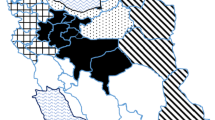Abstract
Based on one of the most widely used datasets by foreign-based sociologists, this paper examines the rate of returns to education in rural China. Compared with the previous studies that showed rather low rates in rural areas throughout the 1980s, this study finds a considerably higher rate in 1996. A chief contributor is the rapid non-agricultural development, which creates enormous upward mobility opportunities, particularly for the more educated. Due to the uneven economic development nationwide, the rate of returns to education varies widely across regions. In areas with less developed non-agricultural sectors, it remains low. In contrast, where off-farm employment is widespread, it is much higher. In addition, the labor market is functioning to allocate the more educated to better-paid jobs, but has yet to produce higher returns to education in non-agricultural sectors than in the agricultural sector. However, changes may be occurring in coastal regions.
Similar content being viewed by others
References
Bian Y, Logan J R (1996). Market transition and persistence of power: The changing stratification system in urban China. American Sociological Review, 61(5): 739–758
Bian Y, Zhang Z (2002). Marketization and income distribution in urban China, 1988 and 1995. Research in Social Stratification and Mobility, 19: 377–415
Brainerd E (1998). Winners and losers in Russia's economic transition. American Economic Review, 88(5): 1094–1116
Chase R S (1998). Markets for communist human capital: Returns to education and experience in the Czech Republic and Slovakia. Industrial and Labor Relations Review, 51(3): 401–423
Chen X Y, Chen L K, Xia C (2003). Changes and implications of returns to education in urban China in the 1990s. Peking University Education Review, (2): 65–72 (in Chinese)
Chiswick B R (1971). Earnings inequality and economic development. Quarterly Journal of Economics, 85(1): 21–39
Entwisle B, Henderson G E, Short S E, Short B J, Zhai F Y (1995). Gender and family businesses in rural China. American Sociological Review, 60(1): 36–57
Hauser S M, Xie Y (2005). Temporal and regional variation in earnings inequality: Urban China in transition between 1988 and 1995. Social Science Research, 34(1): 44–79
Khan A R, Riskin C (1998). Income and inequality in China: Composition, distribution, and growth of household income, 1988–1995. The China Quarterly, 154(2): 221–253
Knight J, Song L (1993). Why urban wages differ in China. In: Griffin K and Zhao R, eds. The Distribution of Income in China. London: Macmillan, 216–284
Li H (2003). Economic transition and returns to education in China. Economics of Education Review, 22(3): 317–328
Li S, Ding S (2003). Long-term trend of returns to education in urban China. Social Sciences in China, (6): 58–72 (in Chinese)
Li S, Li W B (1994). Estimation of the private rate of returns to education in China. In: Zhao R W, Griffin K, eds. Research on Income Distribution in China. Beijing: Chinese Social Sciences Press, 442–456 (in Chinese)
Mincer J (1974). Schooling, Experience and Earnings. New York: Columbia University Press, 84–90
Nee V (1989). A theory of market transition: From redistribution to markets in state socialism. American Sociological Review, 54(5): 267–282
Orazem P F, Vodopivec M (1995). Winners and losers in transition: Returns to education, experience, and gender in Slovenia. World Bank Economic Review, 9(2): 201–30
Psacharopoulos G (1981). Returns to education: An updated international comparison. Comparative Education, 17(3): 321–341
Rutkowski J (1996). High skills pay off: The changing wage structure during economic transition in Poland. Economics of Transition, 4(1): 89–111
Sakamoto A, Chen M D (1991). Inequality and attainment in a dual labor market. American Sociological Review, 56(3): 295–308
Walder A G (2002). Markets and income inequality in rural China: Political advantage in an expanding economy. American Sociological Review, 67(2): 231–253
Walder A G, Zhao L T (2006). Political office and household wealth: Rural China in the Deng Era. The China Quarterly, 186(2): 357–376
Wei X, Tsang M C, Xu W B, Chen L K (1999). Education and earnings in rural China. Education Economics, 7(2): 167–187
World Bank (1997). Sharing Rising Incomes: Disparities in China. Washington D.C.: World Bank, 8–9
Wu X G (2002). Work units and income inequality: The effects of market transition in urban China. Social Forces, 80(3): 1069–1099
Wu X G, Xie Y (2003). Does the market pay off? Earnings returns to education in rrban China. American Sociological Review, 68(3): 425–442
Xie Y, Hannum E (1996). Regional variation in earnings inequality in reform-era urban China. American Journal of Sociology, 101(4): 950–992
Yue C J (2004). The impact of education on income difference in urban China. China Economic Quarterly, 13(Suppl 3): 135–150 (in Chinese)
Zhao W, Zhou X G (2002). Institutional transformation and returns to education in urban China: An empirical assessment. Research in Social Stratification and Mobility, 19: 339–75
Zhou X G (2000). Economic transformation and income inequality in urban China. American Journal of Sociology, 105(4): 1135–1174
Zuker L G, Rosenstein C (1981). Taxonomies of institutional structure: Dual economy reconsidered. American Sociological Review, 46(6): 869–884
Author information
Authors and Affiliations
Corresponding author
Additional information
Translated from Zhongguo Shehui Kexue 中国社会科学 (Social Sciences in China), 2006, (3): 98–109
Rights and permissions
About this article
Cite this article
Zhao, L. Returns to education in rural China. Front. Educ. China 2, 30–47 (2007). https://doi.org/10.1007/s11516-007-0003-1
Issue Date:
DOI: https://doi.org/10.1007/s11516-007-0003-1




